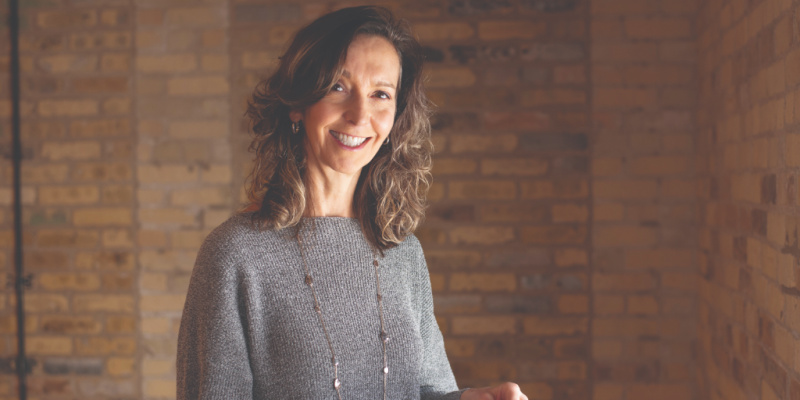By Sue Sveum | Sponsored by SSM Health
Narratives about breast cancer often revolve around the diagnosis and treatment. It’s rare we hear about the after effects of the disease. SSM Health surgeon Susan Charboneau, MD, and breast cancer survivor Jacy Allen-Boldebuck talk about what happens after breast cancer treatment — and how to adjust to a new normal.
Social worker Jacy Allen-Boldebuck was very familiar with breast cancer. Her mother and sister are both survivors, so she’s always gotten regular mammograms. “I discovered you can do everything right and still get cancer,” she says, describing her reaction to a Saturday morning call from her doctor. “When I saw her number I thought, ‘this is going to change things for me forever.’”
And she was right. “Your brain kicks into survival mode,” she says. “Luckily, my doctor and SSM Health were very fast and caring.”
Allen-Boldebuck had a needle biopsy followed by surgery and 20 radiation treatments. “It was a strange, all- consuming journey,” she recalls, but her SSM Health team went above and beyond to make her feel informed and cared for.
From the very beginning of the process, Allen-Boldebuck says her care team at SSM Health were positive and straight forward, warm and attentive to every detail.
After surgery, her surgeon, Dr. Susan Charboneau, would call her personally with results and updates. “I loved and trusted her,” Allen-Boldebuck says.
Dr. Charboneau says the cancer treatment journey can be harrowing and patients often express a sigh of relief after each phase. “I try to offer support and reassurance, hoping to empower them and alleviate their fears.”
After Allen-Boldebuck’s treatment ended, she says she experienced physical side effects — including fatigue, burning and discoloration from the radiation, and a painful hematoma from the biopsy. But it’s the emotional effects that she believes hits people the hardest.
Depression and even PTSD (post- traumatic stress disorder) are common after cancer treatment, but Allen-Boldebuck says she mostly experienced anxiety and trouble sleeping. “It’s hard to return to the life you had before cancer,” she says.
“You have to choose to replace it with something better, so you don’t feel like your life was taken from you,” she adds. “You can’t just let go and move on. Before each mammogram, I now have to reassure myself the odds are in my favor.”
Dr. Charboneau understands. “After treatment, there’ll always be the worry of recurrence which comes with living with cancer,” she explains. “But hopefully as time passes, the focus shifts to resuming a fulfilling life.”
“Be conscientious of your feelings,” advises Allen-Boldebuck. “Take something from the experience that made you feel better and continue doing it — meditate, go for a run, enjoy eating healthier.”
Dr. Charboneau concurs, adding, “There’s growing evidence that adhering to a healthy diet, and maintaining a healthy weight and active lifestyle with regular exercise are all important.”
And getting back to a sense of normalcy is also important, according to Allen-Boldebuck. “I’ve always had high energy and a strong sense of self, and those were gone for a while,” she
says. “So, I rated my anxiety from 1-10 each day and kept a daily journal.” She’s also found a sense of comfort and wellbeing from starting her day with calming meditation. “It’s part of my routine now, like brushing my teeth,” she laughs.
And don’t be afraid to accept support. “I had great support from my family, my friends and my church,” says Allen-Boldebuck. “I discovered women that I’d had no idea were breast cancer survivors who reached out to me.”
Family and friends are vital for support, says Dr. Charboneau, but there are also organizations, like Gilda’s Club and After Breast Cancer Diagnosis (a mentorship-based organization), that can help provide a sense of connection.
“There are definitely gifts from surviving cancer that are worth having,” Allen-Boldebuck says.“Things seem more precious now. This has been a reminder of how much I love my life.”
HEALING NATURALLY AFTER CANCER
Community Pharmacy has natural remedies that alleviate many post-cancer symptoms and effects.
After completing cancer treatments, many people experience relief, but also anxiety or depression. Some also have trouble sleeping or have pain from scars or radiation burns. But there are holistic alternatives.
“We understand that many [men and] women still have fear and anxiety that lingers there after treatment,” says Jackie Nikolaus of Community Pharmacy. In her 35 years of working at the cooperatively-run pharmacy, she’s learned a lot about remedies of all kinds for post-cancer patients.
For anxiety, Nikolaus recommends herbal supplements such as the passion flower (which also helps to uplift mood), Albizia (also known in Chinese Medicine as the happy tree), B-complex vitamins and magnesium.
She also suggests Kava Kava to relax the mind as well as body, and lemon balm, which is a common plant of the mint family. “It’s an amazing nervous system tonic,” she says, “and because it tastes so good, it’s easy to take in any form — even tea.”
Adaptagenic herbs can strengthen the immune and nervous systems. Ashwagandha is great for adrenal support and keeping the body’s system in balance. Holy basil can have a calming effect and can also lower cortisol levels.
For sleep, Nikolaus recommends magnesium or CBD before bed. “Another of my favorites is California poppy,” she says, “It’s great
for shutting down your mind at night.” But be aware — although it’s safe and non- addictive, it may appear on a drug test.
Radiation burns and scarring are another common problem that respond well to natural remedies. “St. John’s Wort oil iseffective by itself or in many healing salves,” says Nikolaus, “or look for calendula, comfrey and rosehip seed oil to promote healing.”
And for overall wellbeing, Nikolaus suggests essential oils or aromatherapy, especially lavender.
Community Pharmacy has a wide range of products, from from wearable oils and natural bath products to tabletop diffusers. —SS
It’s always wise to consult with your practitioner before taking natural remedies. Community Pharmacy’s staff and pharmacists are available to help check for potential drug interactions.




